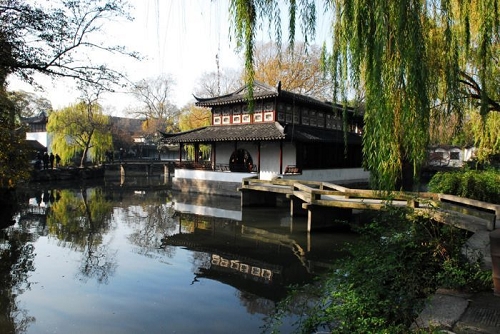|
T of C
Home |
My Work |
Hand- books |
Qin as Object |
Qin in Art |
Poetry / Song |
Hear, Watch |
Play Qin |
Analysis | History |
Ideo- logy |
Miscel- lanea |
More Info |
Personal | email me search me |
| Qin bios | 首頁 |
|
Lu Guimeng
1
|
陸龜蒙
"陸龜蒙住宅 Lu Guimeng residence"2 |
 Lu Guimeng (d. 881), style name Luwang, nicknames Tiansuizi, Fuli Xiangsheng, Jianghu Sanren (Wanderer in Rivers and Lakes3), etc., was an important 9th century poet who abstained from fine food, alcohol, festivities, etc., instead floating on a boat with his books, fishing tackle and equipment for making tea. He was from Changzhou, now part of Suzhou, but after retiring from office he presumably abandoned his Suzhou residence as he is said to have subsequently made his home in Fuli (now called Luzhi). There is a grave said to be his in Luzhi, near the Wusong River southeast of Suzhou.4
Lu Guimeng (d. 881), style name Luwang, nicknames Tiansuizi, Fuli Xiangsheng, Jianghu Sanren (Wanderer in Rivers and Lakes3), etc., was an important 9th century poet who abstained from fine food, alcohol, festivities, etc., instead floating on a boat with his books, fishing tackle and equipment for making tea. He was from Changzhou, now part of Suzhou, but after retiring from office he presumably abandoned his Suzhou residence as he is said to have subsequently made his home in Fuli (now called Luzhi). There is a grave said to be his in Luzhi, near the Wusong River southeast of Suzhou.4
Lu is commonly paired with his friend Pi Rixiu and the two of them are particularly known for having created a style of matching rhyme poetry in which first one would compose a poem, then the other would have to reply with a new poem using the same rhyme. Both were also said to have loved wine and boating, with Lu Guimeng in particular noted for preferring a life on rivers and streams.
Eventually Lu Guimeng is said to have given up wine for tea. Nevertheless, he is often connected to the qin melody Zui Yu Chang Wan.
Some of his qin related writings are in Qinshu Daquan. In particular, these include,5
A poem by his friend Pi Rixiu should also be mentioned for its connection to the qin through the melody Chun Si.
Footnotes (Shorthand references are explained on a
separate page)
1.
Lu Guimeng references
42620.407 陸龜蒙, 字魯望,號江湖散人, 等; also Giles and Nienhauser), literary name Luwang, nickname Jianghu Sanren, etc. Other nicknames included Tiansuizi and Mr. Fuli (甫立先生 Fuli Xiansheng); Fu Li, modern name 甪直 Luzhi, is near the Wusong River (see further). He is discussed in detail in Wiki as well as in Nienhauser, Indiana Companion to Traditional Chinese Literature, p.604.
(Return)
2.
"陸龜蒙住宅 Lu Guimeng residence"
This image is from the Humble Administrator's Garden (Zhuozheng Yuan 拙政園. As described in Wiki), "the garden's site was initially the residence and garden of Lu Guimeng, a Tang Dynasty scholar". It is now one of the "Four Famous Gardens" of Suzhou and is regularly associated with Lu. Thus this particular image is from a website which describes it as follows:
位於蘇州市東北街178號,是江南園林的代表,也是蘇州園林中面積最大的古典山水園林,被譽為“中國園林之母”,中國四大名園之一,全國重點文物保護單位,國家5A級旅遊景區,全國特殊旅遊參觀點,世界文化遺產。
However, it is unlikely that anything remains of what Lu may originally have had here.
(Return)
3.
Wanderer in rivers and lakes (江湖散人 Jianghu Sanren)
In modern times "rivers and lakes" has become a very popular term for vagabonds who are often martial artists. The origin of this is not clear. For "jianghu" 17496.316 江湖 gives five basic meanings:
This expression aside, as yet I have not yet found here or in other dictionaries any information about the origin of the sentiment making heroes (or anti-heroes) of those who "走江湖 wander in rivers and lakes". Certainly it dates at least to the famous novel
Shui Hu Zhuan. Other dictionaries also seem to suggest this term a criticism, though perhaps implying popularity. There are many references on this site to "jianghu" in connection to gentlemen traveling around (often "with
qin and books" or (later?) with qin and sword". I do not know when "people of rivers lakes" became popular as a term for wandering martial artists (as in Smiling Proud Wanderer).
(Return)
4.
For Luzhi see Wiki
(Return)
5.
Lu Guimeng writings that mention qin
Not yet translated.
Return to the Biographies
or to the Guqin ToC.
The texts of those listed above are as follows,
天近秋風爽氣生,﹏珠人會七絃鳴。
木搖殘雨欹危綠,灘逓重岡迤邐清。
合有游魚槕煙藻,不唯靈盒覺風檉。
溪邊月墜雲收好,誰為丹臺刻姓名。
嘗聞昔者包羲氏,修目龍脣粲龜齒。
天地高厚兩無言,正聲猶在椅桐裡。
(total 122字 with something 缺 missing in middle, ending:)
迤邐捩撇憂摧殘,今夕逢君還一彈。)
園客麗獨繭,詩人吟五緵。
如何墨子淚,反以悲途窮。
我意豈如是,願參天地功。
為線補君袞,為弦系君桐。
左右修闕職,宮商還古風。
端然潔白心,可與神明通。
The two legacies are stone used for pillows and the
qin mats used with them
二遺者(何?)石枕材,琴薦也。石者何,松之所化也。化於何?越之東陽也。東陽多名山,就中金華為最,枝峰蔓壑,秀氣磅礴(者數)百里,不啻神仙登臨。草木芬怪,永康之地,亦蟬聯其間。中饒古松,往往化而為石,盤根大柯,文理曲折,盡為好事者得而致於人間,以為耳目之異。太平羊振文得枕材,趙郡李中秀得琴薦,皆茲石也。咸以遺予,予以二遺之奇,聊賦詩以謝云。
誰從毫末見參天?又到蒼蒼化石年。
萬古清風吹作籟,一條寒溜滌成川。
閒追金帶徒勞恨,靜格朱絲更可憐。
幸與野人俱散誕,不煩良匠更雕鎸。
Two poems connected by narrative; published elsewhere as 紫溪翁歌 with a few different characters
紫溪翁遇角里(甫里?)先生,舉酒,相属醉而歌曰:
一丘之木,乃栖深也屋,
吾容不辱;一溪之石,其平居也席,
吾傍以息;一竇之泉,其音清也絃,
吾方在懸。得乎人,情得乎天,吾不知所以然(而然)。
先生弁而賡之,曰:
采江之漁兮,朝船有鱸;
采江之蔬兮,暮筐有蒲。
左圖且書,右琴與壺。
壽歟夭歟,貴歟賤歟。
歌缺而去。
蕙風杉路共清音,三峽寒泉瀨玉琴。
君到南朝訪遺事,柳家雙璅舊知音
Elsewhere the text is also written as follows:
蕙風杉露共泠泠,三峽寒泉瀨玉清。
君到南朝訪遺事,柳家雙鎖舊知名。
(Return)